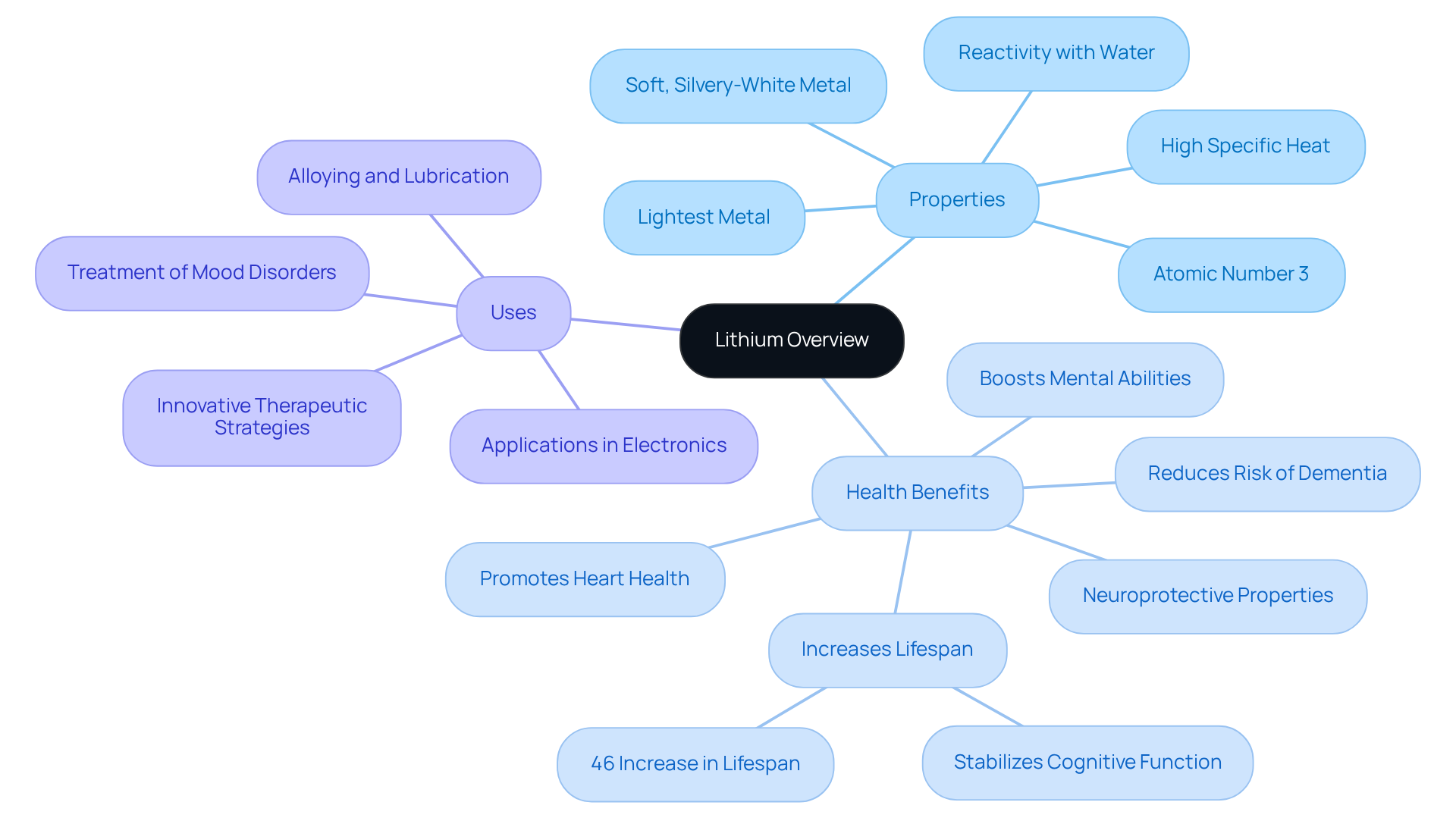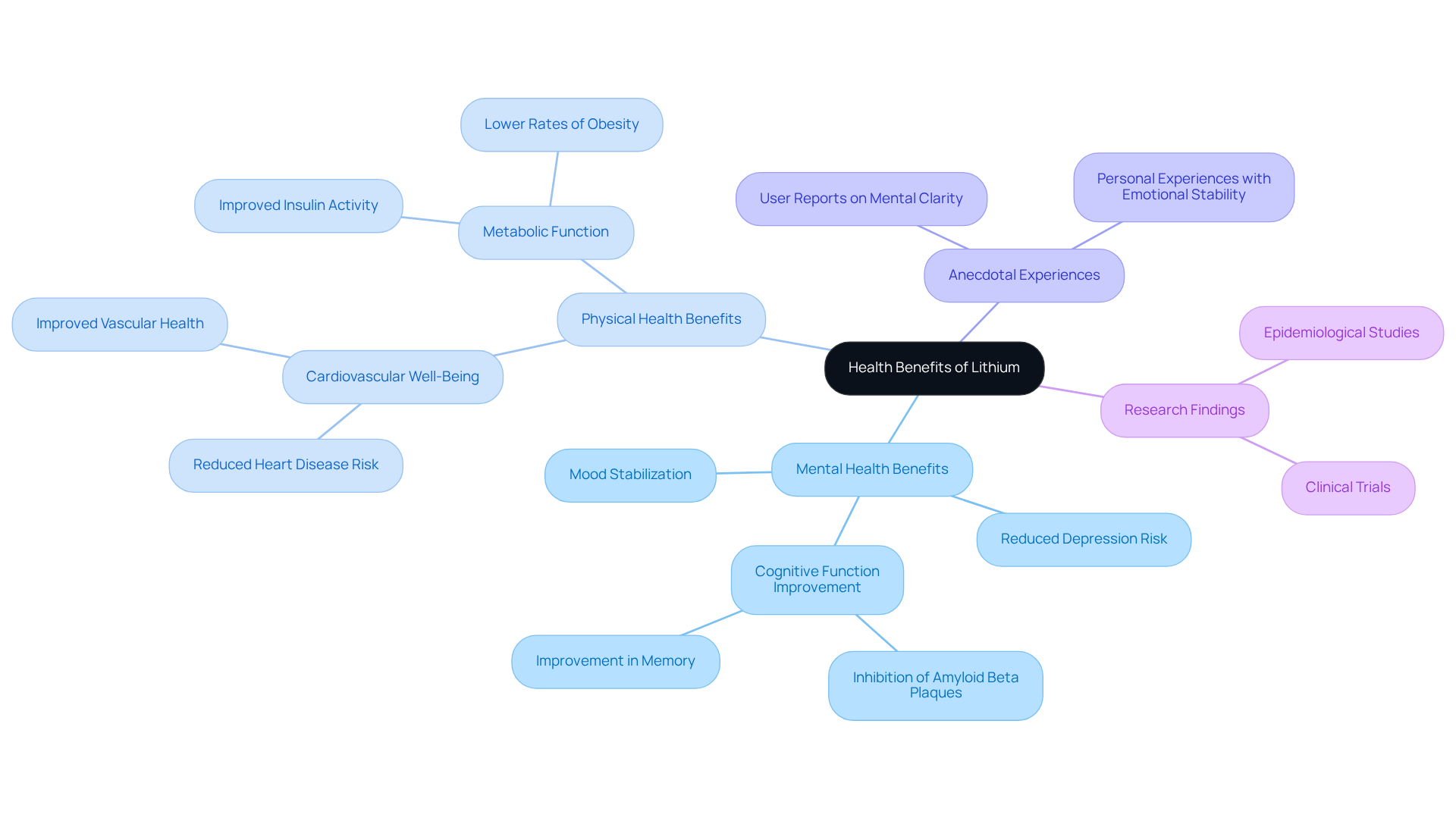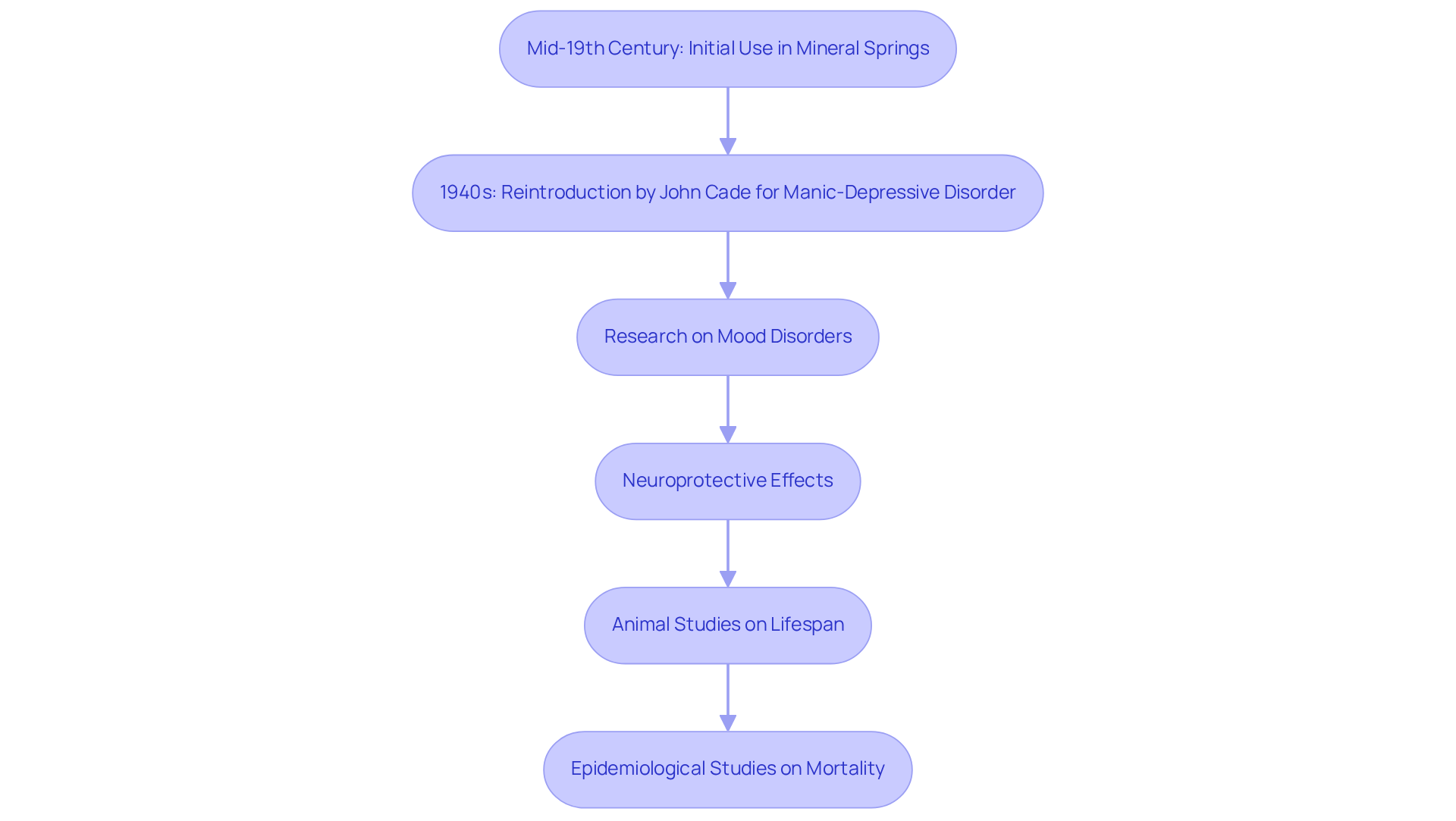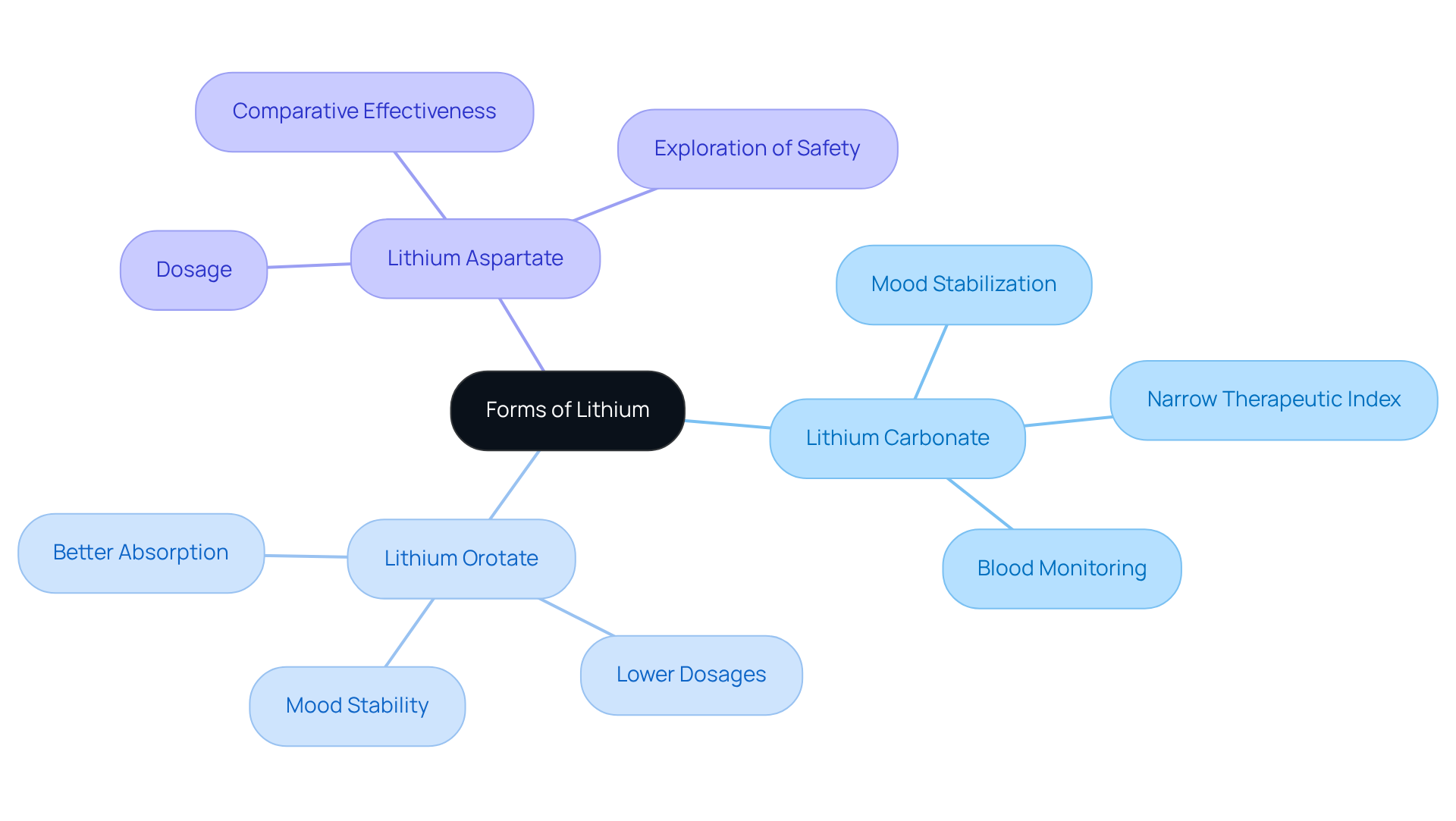Understanding the Benefits of Lithium for Health and Wellness
Overview
The benefits of lithium for health and wellness are noteworthy. They include:
- Mood stabilization
- Neuroprotective effects
- Potential enhancements in cognitive function and longevity, particularly when taken in small doses
Various studies support these claims, linking lithium to improved mental health outcomes and reduced rates of diseases such as Alzheimer’s. Furthermore, research indicates that lithium may contribute to increased lifespan. This highlights its evolving role in both traditional and modern therapeutic contexts, inviting further exploration into its applications.
Introduction
Lithium, a remarkable element with a history steeped in both ancient remedies and modern medicine, has recently garnered attention for its diverse health benefits. This versatile alkali metal not only plays a critical role in treating mood disorders but also shows promise in enhancing cognitive function, promoting heart health, and even extending lifespan when consumed in microdoses.
Furthermore, as research continues to unfold, questions arise:
- How can lithium’s unique properties be effectively harnessed for overall wellness?
- What are the implications of its various forms?
Exploring these aspects reveals the potential of lithium as a transformative supplement in the pursuit of health and longevity.
Defining Lithium: An Overview of Its Properties and Uses
Lithium, a soft, silvery-white alkali metal with the atomic number 3, is recognized as the lightest metal. It exhibits high reactivity, particularly with water, where it forms hydroxide and hydrogen gas. Traditionally utilized in the treatment of mood disorders, the benefits of lithium have significantly expanded in terms of therapeutic potential in recent years.
Studies suggest that the benefits of lithium, such as boosting mental abilities, promoting heart health, and aiding in overall longevity, can be observed even in small amounts. For instance, research has indicated that microdoses stabilize mental function in Alzheimer’s patients. Additionally, observational studies imply that the benefits of lithium in drinking water are associated with reduced mortality rates.
Furthermore, the benefits of lithium include its neuroprotective properties, which may reduce brain shrinkage and promote the formation of synapses, enhancing memory and cognitive skills. Notably, the benefits of lithium include the demonstration that small amounts can increase lifespan by as much as 46%. These findings emphasize the significance of comprehending lithium’s chemical characteristics and its various uses in wellness, paving the way for innovative therapeutic strategies.

Exploring the Health Benefits of Lithium: Mental and Physical Advantages
Lithium, particularly in low doses, has emerged as a promising supplement due to the benefits of lithium for health. Research highlights the benefits of lithium, including its ability to stabilize mood, reduce the risk of depression, and improve mental function. Significantly, studies indicate that small doses of certain compounds can play an essential role in averting mental decline among older individuals, with evidence suggesting a decrease in the occurrence of Alzheimer’s disease. For instance, low-dose medication has been shown to inhibit the accumulation of amyloid beta plaques, a hallmark of Alzheimer’s pathology, potentially delaying cognitive deterioration.
Furthermore, the benefits of lithium include advantages for cardiovascular well-being, as they may reduce the likelihood of heart disease and enhance metabolic function. Epidemiological research, including a significant study in Texas, has associated trace levels of a specific mineral in drinking water with decreased rates of dementia and lower cardiovascular mortality, emphasizing the benefits of lithium as a potential beneficial supplement for enhancing overall well-being and wellness.
By integrating knowledge from the Hunza people’s way of life, recognized for their extraordinary lifespan, we can observe similarities in the possible advantages of this element. Just as the Hunza people thrive on a diet rich in quality nutrients, this element might serve as a supplementary addition in a comprehensive strategy for well-being. Personal experiences shared by users highlight the benefits of lithium on mental clarity and emotional stability, reinforcing its importance in a holistic anti-aging strategy. As research continues to investigate the therapeutic effects of this substance, particularly in microdoses, its role in enhancing cognitive clarity and supporting mental health becomes increasingly significant.

The Historical Context of Lithium in Health: From Ancient Remedies to Modern Applications
Lithium’s medicinal use dates back to the mid-19th century, initially recognized for its therapeutic properties in mineral springs believed to heal mental ailments. The contemporary period of treatment using lithium salts commenced in the 1940s when Australian psychiatrist John Cade reintroduced lithium carbonate for addressing manic-depressive disorder. This pivotal moment marked a significant shift in psychiatric treatment, leading to extensive research that established the effectiveness of this substance in managing mood disorders, alongside the benefits of lithium in providing neuroprotective and anti-aging effects.
Research indicates that low-dose mineral supplementation may exert these effects through various mechanisms. These include:
- Modulating intracellular signaling pathways
- Reducing oxidative stress
- Promoting neurogenesis
Animal model studies have shown that lithium-based supplementation can prolong lifespan and enhance healthspan, effectively postponing the onset of age-related illnesses and cognitive deterioration. Furthermore, epidemiological studies have indicated a link between elevated levels of a certain mineral in drinking water and reduced rates of mortality and dementia in human populations.
Over the decades, this element has evolved from a natural remedy to a cornerstone of psychiatric care. Its applications have expanded into areas such as suicide prevention and the benefits of lithium for neurodegenerative diseases. This historical viewpoint highlights the lasting significance of lithium in modern wellness conversations, illustrating its evolution from traditional cures to a scientifically supported treatment choice.

Different Forms of Lithium: Variations and Their Specific Health Applications
Lithium is available in various forms, including carbonate, orotate, and aspartate, each offering distinct properties and health applications. Lithium carbonate is the most widely prescribed form for mood stabilization in bipolar disorder, recognized for its effectiveness in managing manic and depressive episodes. However, it has a narrow therapeutic index, which can lead to complications and treatment non-compliance due to the necessity for regular blood monitoring.
In contrast, orotate is often promoted as a dietary supplement, celebrated for its potentially better absorption and reduced side effect profile. Individuals using orotate frequently report advantages such as enhanced mood stability and improved mental function, often at lower doses compared to those required for carbonate. For instance, a study indicated that orotate could effectively inhibit hyperlocomotion in animal models at doses as low as 1.5 mg/kg, compared to 15-20 mg/kg for carbonate.
Research suggests that orotate may improve mood and cognitive abilities while minimizing negative effects, making it an appealing option for those seeking alternatives to conventional therapy. Nonetheless, the long-term safety and efficacy of orotate are still under investigation, with calls for more robust clinical trials to substantiate its benefits.
Additionally, aspartate is another form that has been utilized, typically at a dosage of 10 mg once daily. While it shares some similarities with orotate, the comparative effectiveness and safety profiles of these forms are still being explored. Understanding these variations is crucial for individuals considering the benefits of lithium supplementation for health and wellness, as each form may provide unique advantages based on individual health needs and conditions.

Conclusion
In conclusion, lithium has emerged as a multifaceted element offering a wide array of health benefits, from stabilizing mental health to potentially enhancing longevity. Its unique properties and various applications underscore its role as a significant contributor to overall wellness, making it a vital subject of study in both historical and modern contexts.
This article has explored lithium’s therapeutic advantages, highlighting its effectiveness in treating mood disorders, promoting cognitive function, and supporting cardiovascular health. Notable findings indicate that even microdoses of lithium can yield substantial benefits, such as reducing the risk of Alzheimer’s and enhancing memory. Furthermore, examining different forms of lithium, including carbonate and orotate, reveals their unique health applications, allowing individuals to select the most suitable option for their needs.
Reflecting on these insights, it is evident that lithium’s potential extends beyond traditional psychiatric treatments. As research continues to uncover its diverse benefits, there is a compelling case for integrating lithium into holistic health strategies. Embracing this knowledge can empower individuals to make informed decisions about their wellness journey, potentially unlocking new avenues for improving both mental and physical health.
Frequently Asked Questions
What is lithium and what are its basic properties?
Lithium is a soft, silvery-white alkali metal with the atomic number 3, recognized as the lightest metal. It exhibits high reactivity, especially with water, producing hydroxide and hydrogen gas.
What are the traditional uses of lithium?
Traditionally, lithium has been utilized in the treatment of mood disorders.
How has the understanding of lithium’s benefits expanded in recent years?
Recent studies suggest that lithium has therapeutic potential beyond mood disorders, including benefits such as boosting mental abilities, promoting heart health, and aiding in overall longevity.
What are some specific benefits of lithium observed in research?
Research indicates that microdoses of lithium can stabilize mental function in Alzheimer’s patients and that lithium in drinking water is associated with reduced mortality rates.
What neuroprotective properties does lithium have?
Lithium has neuroprotective properties that may reduce brain shrinkage and promote the formation of synapses, which can enhance memory and cognitive skills.
How much can small amounts of lithium potentially increase lifespan?
Small amounts of lithium have been shown to potentially increase lifespan by as much as 46%.
Why is it important to understand lithium’s chemical characteristics and uses?
Understanding lithium’s chemical characteristics and its various uses in wellness is significant for paving the way for innovative therapeutic strategies.






